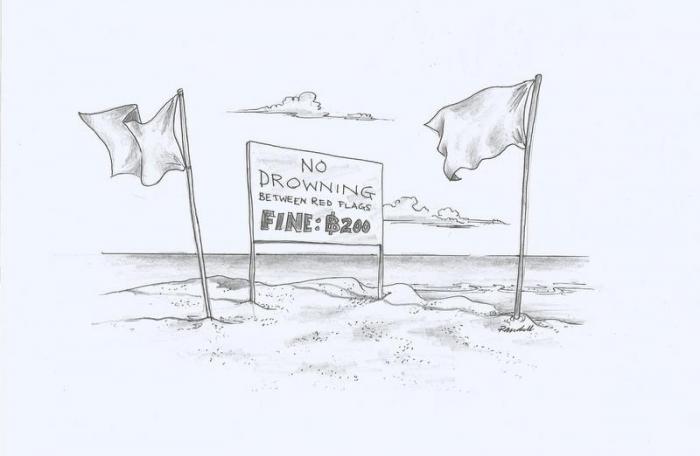Opinion: Phuket lifeguards need more muscle

PHUKET: After years of contractual disputes leaving Phuket’s beaches devoid of essential life saving services, as the annual southwest monsoon season whipped up deadly rip currents along our west-coast beaches, we applaud the Phuket Provincial Administration Organization (PPAO) and the Phuket Lifeguard Club (PLC) for quickly re-signing their contract and breaking this vicious cycle.
Officials consistently blamed the failure to have lifeguards on the beaches on bureaucratic red tape as well as the necessary deposit that the PLC had to pay to make the bid.
It is a great relief that the PLC was able to quickly find the funds to rebid on the contract for another 10 months.
The PLC agreeing to the exact same remuneration as the previous two years, despite rising costs of living in Phuket, also played a factor in fast tracking the signing of the contract. In 2014, Phuket Lifeguard Club President Prathaiyut Chuayuan cut lifeguard staff by about 20 per cent due to the constraints of the 22-million-baht budget. With lifeguards only making between 15,000 and 18,000 baht a month, he was still forced to have only 88 guards on duty throughout the island, instead of the previous 108 (story here). Since then, only 10 more guards have been added to the PLC’s ranks.
Last year, one person died on a Phuket beach as the PPAO and PLC tried to come to an agreement. Shortly after the lifeguards returned, there were two more deaths – it is hard to imagine how many would have died had they not returned.
Most days of the low season, lifeguards are involved in so many rescues that it surpasses their ability to even keep records of who was saved and when, as they are often forced to risk their own lives to save four or five people who have been knocked over in shallow water and dragged out to sea.
The dumbfounding frequency of water rescues on the island’s beaches is mostly due to tourists – domestic and international – ignoring lifeguards’ warnings and swimming in red-flag zones.
In years past, efforts to prevent people from swimming in dangerous areas were focused on signage. Signs in various languages, including Chinese, Russian, English and Thai, were erected on beaches. A local expat even designed multilingual beach-safety advice cards, printing them at his own cost and distributing them for free. Nonetheless, Phuket’s waves and rips continue to kill more than a dozen people every year.
The next step is to empower lifeguards with the ability to remove beachgoers from the sands if they fail to heed warnings.
At the very least, clear communications between lifeguards and police should allow guards to call in a fast-response team to remove people from the beach if necessary.
No lifeguard should be forced to risk his or her life twice on the same day for the same person who simply refuses to use common sense by ignoring red flags and warnings. Giving guards the power to remove such people from the beach, not only ensures the safety of the tourists (though they may not see it that way), it also ensures the safety of the lifeguards themselves.
Latest Thailand News
Follow The Thaiger on Google News:


























